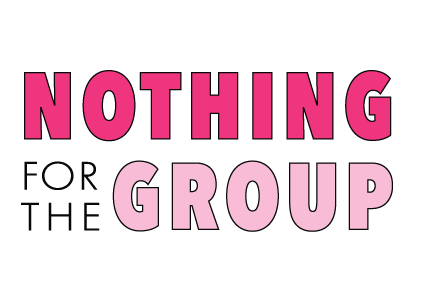You’re reading Nothing for the Group, a newsletter where one dramaturg rounds up one week in theatre news, reviews, and takes. If you like this kind of thing:
This newsletter is free — no gods, no masters, no paywalls — but if you’d like to sustain this project, you can support me on Venmo (@halvorsen) or Paypal.
If you want to say hi, you can email me, tweet @halvorsen, or just reply to this email.
If you’re an artist or administrator in financial need, or if you’d like to directly support theatremakers in your community, here’s a great round-up of local and national grants and resources from Creative Capital.
Identity design by Elizabeth Haley Morton.
this week in abusive men: Scott Rudin
When Scott Rudin releases a vague apology in the Saturday edition of the Washington Post — and you compile a theatre newsletter that doesn’t run until the next Friday — it means you’re totally exhausted from The Discourse™ by mid-week. What can I say about Rudin’s extravagant cruelty — and the complicity of those who enable or ignore it — that hasn’t already been said? Should I really waste my one wild and precious life analyzing his cynical yet entirely predictable “apology” when I still have five seasons of The Nanny to watch on HBO Max? (I will absolutely write “Is Maxwell Sheffield A Good Producer? An Investigation” if it’s what the people want.)
And then late last night, Vulture dropped “Scott Rudin, As Told By His Assistants”: a massive report quoting 33 former staff members who worked for Rudin from 1994 to 2020. It’s a harrowing, comprehensive portrait of a psychologically traumatizing workplace — and it re-centers the experiences of Rudin’s staff after a week of awful spin and silence from the industry.
So attention must be paid. Here’s the Rudin rundown for this week:
April 17: Scott Rudin releases a written statement to critic Peter Marks at The Washington Post:
“Much has been written about my history of troubling interactions with colleagues, and I am profoundly sorry for the pain my behavior caused to individuals, directly and indirectly…After a period of reflection, I’ve made the decision to step back from active participation on our Broadway productions, effective immediately. My roles will be filled by others from the Broadway community and in a number of cases, from the roster of participants already in place on those shows.”
Rudin didn’t clarify what “step back from active participation” meant, but it’s meaningless language. One can assume he’ll still be profiting from shows while going to anger management classes or some other face-saving measure to avoid real consequences. (I’ll also note that his use of the word “colleagues” here is a deliberate tactic to mask the power dynamics of his abusive interactions with assistants.)
The other big takeaway from the article was this line by Peter Marks:
“An exit by Rudin has potentially immense consequences for an industry that is short on visionary leaders.”
Folks were less than thrilled with this assessment, especially since it doesn’t acknowledge that the perceived dearth of up-and-coming producers is due to the prohibitively expensive and inaccessible landscape of commercial theatre, rather than a lack of available talent. Rudin’s potential exit doesn’t mean that someone else (who won’t build an empire on a foundation of abuse) isn’t capable of producing celebrity-driven revivals of classic musicals on Broadway, or the Lucas Hnaths and Taylor Macs of the world. (David Gordon expounded on this sentiment and the problem of access and opportunity for emerging producers in an essay for TheaterMania this week.)
In response to his statement, Equity called for Rudin to release his employees from any nondisclosure agreements. (I wish this call was explicitly made to other regional theatres trying to rebuild in the wake of abusive leaders. You can’t create safe, respectful workplaces if past and present employees are legally bound from speaking freely about their experiences.)
April 18: David Graham-Caso — the identical twin brother of Kevin Graham-Caso, a former Rudin assistant who took his own life last fall — released the following video detailing the way Rudin “berated and demeaned, bullied and intimidated and harassed” his late brother:
March 20: Rudin “steps away” from five pending film projects, including Stephen Karam’s adaptation of The Humans and Lila Neugebauer’s first directorial feature. There was no official comment or confirmation that Rudin’s name won’t appear in the credits of these films, because why be specific about anything at this point?
March 22: The March on Broadway, organized by actors Nattalyee Randall and Courtney Daniels, rallied for proper accountability and safety in the theatre industry. Per Diep Tran in Backstage, the March was “partially focused on Rudin and demanding he be removed from the Broadway League…[and] also focused on Actors’ Equity Association, demanding the union take a proactive stance on ensuring work environments are diverse, safe, and free from harassment and racist incidents.”
March 22: Vulture drops its aforementioned report, detailing a culture of relentless intimidation, bullying, and abuse; the permanent physical and psychological damage suffered by employees; and the complacency of celebrities who witnessed Rudin’s behavior. (It’s a gutting read, reported with rigor and care — but if you’ve had similar early career experiences, it’s extremely triggering.)
In closing: I’ve been thinking about the words of journalist and lawyer Josie Duffy Rice, who posed this question after Derek Chauvin’s conviction for the murder of George Floyd earlier this week: “Accountability is the floor. Ask yourself what is the ceiling?”
There’s been no accountability for the abuse of Rudin’s staff — and the full extent of harm is just now receiving thoughtful reporting, instead of being mythologized as a rite of passage for aspiring theatre workers and a necessary byproduct of “artistic genius”. Scott Rudin voluntarily “stepping back” isn’t the floor, it’s the damn basement. What’s the ceiling?
online theatre
Theater Alliance’s world premiere quartet City in Transition: The Quadrant Series starts streaming April 24th. Directed by Raymond O. Caldwell and written by Khadijah Z. Ali-Coleman, Avery Collins, Shalom Omo-Osagie, and Leslie Scott-Jones, these plays “weave together tales from across Washington, DC — sharing histories, experiences, and issues from within the District's four quadrants —providing a dynamic account of our nation's capital from artists who call the city their home.”
Aleshea Harris’ illustrated audio play Brother, Brother premieres April 26th at New York Theatre Workshop. The project is directed by Shayok Misha Chowdhury and features Affrilachian fiddle music from Jerron “Blind Boy” Paxton and the “stunning visual imaginations” of Ibrahim Rayintakath and Liang-Hsin Huang.
A filmed production of James Ijames’ Fat Ham streams April 29 - May 23 at the Wilma Theater. Directed by Morgan Green, the play is “a witty take on Shakespeare’s Hamlet where the only death is the patriarchy” and “centers a Black, queer discovery of self, softness, and resilience at a cookout in the South.”
Jared Mezzocchi’s interactive Someone Else’s House is now streaming through June 5th at the Geffen Playhouse. Directed by Margot Bordelon, and based on the true story of the Mezzocchi family’s haunting inside a 200-year-old New England house, the experience includes a haunting kit mailed in advance of the Zoom performance.
The Waves in Quarantine starts streaming April 29th at Berkley Rep. The theatrical experiment, conceived by Raúl Esparza and Lisa Peterson, “creates a film in six movements that meditates on themes from the musical adaptation of Virginia Woolf’s masterpiece The Waves.”
Samm-Art Williams’ Home streams April 30 - May 3 at Roundabout Theatre Company. The virtual reading, directed by Kenny Leon, is part of the Roundabout Refocus Project, a multi-year initiative seeking to elevate and restore marginalized plays to the American canon.
ShaWanna Renee Rivon’s Old Black & White Hollywood is now available until May 16th at the Alley Theatre. The online reading is directed by Tiffany Nichole Green and part of the theatre’s Alley All New series.
The National Theatre Network, a new digital platform created to allow major regional theatres to stream productions worldwide, will debut May 15th. The first production will be a filmed adaptation of The Bushwick Starr's Animal Wisdom, written by Heather Christian and co-presented by Woolly Mammoth and American Conservatory Theater. The film is directed by Amber McGinnis, with Emilyn Kowaleski providing stage direction.
2021 season updates
American Shakespeare Center announced its summer season. Chosen by ASC’s new cohort of actor-managers, the company will present Macbeth, Henry V, and All’s Well That Ends Well in repertory.
The Goodman announced its real-time, online Live series. Projects include Adam Rapp’s The Sound Inside (directed by Robert Falls), Adrienne Kennedy’s Ohio State Murders (directed by Tiffany Nichole Green), and Ike Holter’s I Hate It Here (directed by Lili-Anne Brown). Performances will be streamed live online in real time, captured by multiple video cameras, for a limited five-show run.
The Huntington Theatre Company announced its 2021-22 in-person season. The season includes the world premiere of Kirsten Greenidge’s Our Daughters, Like Pillars (directed by Kimberly Senior); Madeleine George’s Hurricane Diane (directed by Jenny Koons); Jen Silverman’s Witch (directed by Rebecca Bradshaw); Mike Lew’s Teenage Dick (directed by Moritz von Stuelpnagel); Lydia R. Diamond’s The Bluest Eye (directed by Awoye Timpo); Heidi Schreck’s What the Constitution Means to Me (directed by Oliver Butler); and the world premiere of Common Ground Revisited.
London’s Bridge Theatre announced its upcoming season. The line-up includes the world premieres of Nina Raine’s Bach & Sons and Bryony Lavery’s adaptation of Philip Pullman’s The Book of Dust—La Belle Sauvage (both directed by Nicholas Hytner), Suzan-Lori Parks’ White Noise (directed by Polly Findlay), and Vox Motus’ socially distanced installation Flight.
the great american AD shuffle
Jim Nicola is stepping down as artistic director of New York Theatre Workshop in July 2022. Nicola has led the company for 34 years.
Sean San José is the new artistic director of the Magic Theatre. The veteran Bay Area actor/director is also a co-founder of Campo Santo, which will become a resident company at the Magic.
things I read this week
Mark Caro’s profile of Victory Gardens’ new artistic director Ken-Matt Martin (NYT)
Elizabeth Vincentelli on how multimedia designer/director Jared Mezzocchi became “the go-to guy for ambitious virtual productions” (NYT)
Damien Lewis’ gorgeous remembrance of his wife, actor Helen McCrory, who died last week at age 52. This Lauren Bacall anecdote alone. What a legend. (Full piece behind the paywall of The Sunday Times, or here):
“One night after another searing performance as Yelena in Sam Mendes’s acclaimed production of Uncle Vanya in New York, there was a knock on the door of her dressing room and in walked Lauren “Betty” Bacall.
“I just came to tell you you were magnificent,” Bacall said. “Thank you so much, your Sonya moved me to tears.”
There was an awkward pause. “Oh, I’m so sorry, I think you want Emily next door — Emily Watson, she played Sonya.” Betty was horrified: “Oh my god, I’m so sorry!”
Helen riposted, “That’s alright Ms. Hepburn, I’m glad you enjoyed the show.” Lauren Bacall threw her head back and laughed and bellowed, “You’re my kind of dame, let’s go out.” And off they went into the night.”








